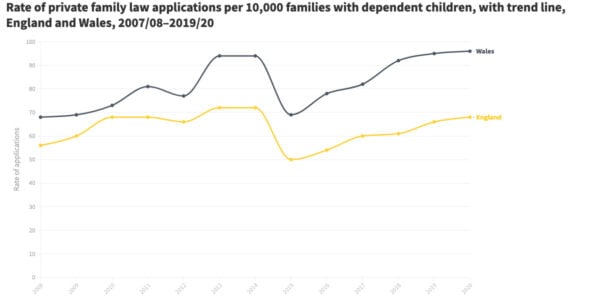“The times they are a-changin” sang Bob Dylan—though he surely didn’t foresee something quite like this.
Everyone is getting used to a new normal following the COVID-19 pandemic, which has swept across all that we knew, affecting how we live—and how we now interrelate. For children of separated parents, some who understand what is happening and some who do not, life has taken on a brand-new meaning.
Where once co-parenting relationships, or steps towards it, were being worked at in order to improve outcomes for children and reduce parental conflict, these sometimes fragile relationships are now being stretched beyond measure.
In the recent Dads Unlimited and South Kent Mind survey of 155 people: 71% of respondents stated that their child arrangements had changed during the pandemic; and 24% of non-resident parents stated that they had been stopped from seeing their children by the other parent altogether. While the majority of parents accept and understand the need for flexibility in these extraordinary times, some families have taken advantage of the grey areas in the guidance from the government and the Family Court.
One of the lawyers who supports Dads Unlimited clients commented that:
The difficulty is that some parents are going to use this as a further opportunity to distance the other parent from the children. As practitioners (lawyers) we need to be alive to this and encourage face time and/or all the indirect contact we can, where it is necessary, and … suggest some further time to make up for missed time if they have a legitimate reason to isolate. The reality is that lots of litigants in person who won’t abide by the very reasonable guidance … and enforcement proceedings are realistically a waste of time with the courts currently under such pressure if you want immediate action. However, if it is a parent who is alienating, then your client will have no choice but to start the long road of litigation in any event.
In retrospect—and, let’s face it, the ‘retroscope’ is a great thing—it may have been useful for senior representatives of the Family Court to also appear on/through the UK media to make a more clear statement about expectations and repercussions if, on an enforcement application, a party is found to not be acting in the best interests of the child.
Our helpline has been inundated with calls from extremely upset mums and dads who, in spite of the guidance, have been told that they cannot see their children owing to coronavirus. Of particular concern are the parents who have reached out to us because they have been prevented from seeing their children by the other parent because they are key workers. This has provoked a deterioration in the mental health of some, and others have been pushed to the brink of suicide. Our mentoring service has worked furiously hard to support these clients (online and over the phone), encouraging them to focus on the fact that the situation is temporary and that they will see their children again.
And for those who had court hearings arranged during lockdown, the remote hearings have had a mixed impact—sadly leaving some people waiting even longer for resolution and extending the time of no contact. Delays in the court system are only to be expected in the current situation. However, where contact is prevented, delays are often then used against the applicant as a reason not to recommence contact too quickly because of the length of time of no contact. This has a devastating effect on parents’ mental health—and one can only wonder what impact these prolonged separation periods have on the children, or how any issues might manifest later on. We should not have a system that extends, or exacerbates, the problems that the system is there to address.
On a more positive note, the apparent lack of appetite (in some cases understandably) of the family court to make final hearings remotely has also had an occasional constructive effect on those parties whose positions are less entrenched. In the absence of magistrates, family court legal advisors have played an unexpected role of triage, establishing facts, parties’ positions, and encouraging—nay forcing—families to come to a consent agreement as an alternative to protracted delays.
This triage service is exactly what is needed in the court system to speed up proceedings, and remove low-level ‘parental conflict’ parties as early as possible in order to relieve pressure on the system.
In the future the family court should consider having a legal adviser to triage cases based on a short initial telephone hearing with both parties as soon as an application is received. This would enable the court to schedule future hearings appropriately or resolve cases immediately through explanation of the legal process and the need for consent where possible.
Nav Mirza, Chief Executive, Dads Unlimited, and Adam Colthorpe, Director of Mentoring & Co-Parenting, Dads Unlimited.
Parents can register for support at https://support.dadsunltd.org, email us (support@dadsunltd.org.uk) or call our helpline (01233 680150).
Dads Unlimited is a registered charity set up to support parents who are going through a family breakdown, as well as supporting them have a better, more constructive relationship with their children. Our mission is to improve lives for the children of separated parents within a healthy and positive co-parenting environment.
South Kent Mind (formerly Folkestone & District Mind) is a mental health charity affiliated to National Mind. Our mission is to improve the lives of people with mental health challenges in South Kent.





